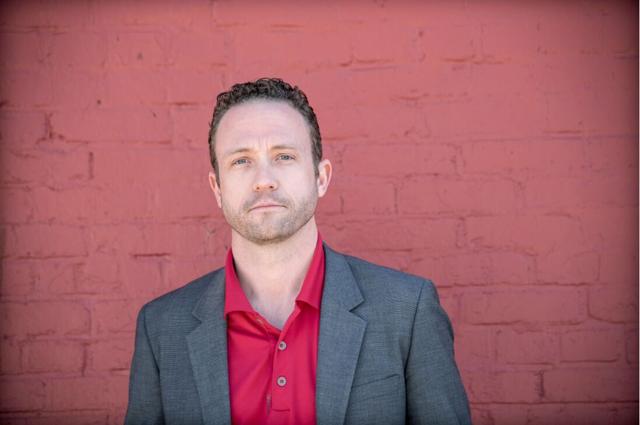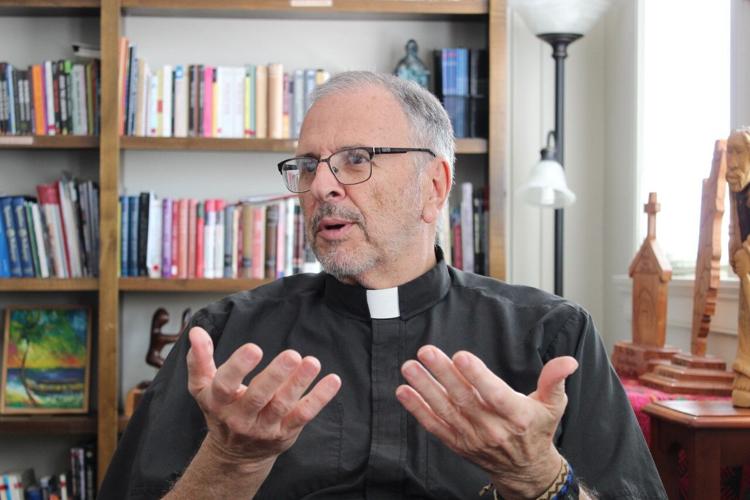NEW ORLEANS (LA)
New Orleans Advocate [New Orleans LA]
April 18, 2021
By Ramon Antonio Vargas
[Photo above: Loyola Maroon file photo of the Rev. Ted Dziak (via Jawdat Tinawi, The Loyola Maroon) Photo by Jawdat Tinawi, The Loyola Maroon.]
A Jesuit priest who founded a Catholic service group resembling the Peace Corps before facing complaints of inappropriate conduct at Boston College and Loyola University is now accused of raping a subordinate on a volunteer mission.
Tim Ballard’s allegations against the Rev. Ted Dziak triggered Dziak’s removal last fall as chaplain at Le Moyne College in upstate New York, where he had landed after leaving Loyola only weeks earlier. It’s unclear whether Dziak faces other consequences.
It is also unclear if any prosecutor would take up Ballard’s accusations, not only because they involve events that occurred nearly 20 years ago, but also because the accuser was an adult at the time and didn’t file a contemporaneous report. Statutes of limitation also make it difficult for him to pursue a civil lawsuit.
Ballard, 40, says he wants to go public with his story about Dziak, 72, because he believes it is crucial for people whose paths have crossed with the cleric to know what happened to him.
In a vocation that’s been haunted by countless molestation allegations, Dziak’s case is different. No one has accused him of harming a child, but he’s been accused several times of abusing his position of trust to emotionally manipulate young men, possibly grooming them for relationships.
Ballard says he was one of those young men. And Ballard says Dziak forced sex on him at least four times in Central America when the two had been drinking. Ballard says he suspects Dziak drugged him as well, and he views what occurred as rape because he was too incapacitated to consent.
Several join Ballard in saying Dziak’s pattern of behavior — recruiting attractive young men to perform community service through a competitive program, setting himself up as a mentor, and isolating them in remote locations where they’d be co-dependent — was as manipulative as that of any abusive priest.
Such allegations of “non-consensual” sex with adult subordinates recently prompted the ouster of the Jesuit priest helming Manhattan’s prestigious Regis High School, the Rev. Daniel Lahart, according to officials. Similar conduct also ended the career of Cardinal Theodore McCarrick of Washington, D.C., although McCarrick’s victims were eventually revealed to include children.

“I’ve been to the darkest places because of Ted Dziak,” Ballard said recently, adding that he believes he would have taken his own life without therapy and support from his family. “I want him to be afraid … that … he’s going to be exposed.”
A message left for Dziak at the Campion Center in Weston, Massachusetts, where he’s been living, went unreturned. Follow-up calls were transferred to the retreat facility’s director, who didn’t return messages.
An attorney for the New York-based Jesuit chapter that supervises Dziak said he couldn’t discuss the priest’s status, saying Ballard has not spoken to the order. Ballard said he has no interest in speaking to church investigators because he isn’t convinced it will result in justice.
Dziak launched an international volunteer program now simply known as JVI out of an office at Georgetown University, one of the Jesuits’ best-known colleges, in 1984.
Jesuit Volunteers International has since placed more than 800 participants in a dozen countries, with members braving rustic conditions to aid schools, churches, social service organizations and community centers. Competition to participate is fierce among devout Catholics wishing to help needy communities in countries like Chile and Tanzania.
JVI’s first-ever volunteer, Dennis Heaphy, says Dziak’s problematic behavior began immediately.
Dziak was pursuing advanced degrees in theology from Weston College when he met Heaphy. Heaphy told Dziak he had thought about becoming a Jesuit and an international volunteer because it felt like saving the world.
Heaphy recalled Dziak saying he would start JVI for Heaphy — and, after doing so, made Heaphy feel indebted.
Dziak bristled when Heaphy begged off invitations to watch movies and drink beer while they got JVI off the ground. Once, Heaphy recalled, Dziak walked into a rectory room where he was staying en route to Belize, told him, “I love you,” and kissed him on his forehead. Heaphy said he did not allow things to go further. The result, he said: Dziak waged psychological warfare on Heaphy, threatening to send him home from Belize and accusing him of ungratefulness.
“I love you — how could you hurt me this way?” Heaphy recalled Dziak saying. “I did all this for you!”
Heaphy’s time at JVI ended in disaster when a diving accident in Belize left him paralyzed. Decades have passed, but Heaphy said Dziak’s treatment of him still haunts him.
“Ted,” Heaphy said, “used the classic steps of a pathological abuser.”
He isn’t alone in his opinion.
Troubling violation
By 1990, Dziak had gone to Boston College to serve as assistant to the university’s president. He didn’t run JVI anymore, but continued arranging mission trips through a program named “Ignacio Volunteers,” referencing San Ignacio de Loyola, the Jesuits’ founder.
Participants reported experiences similar to Heaphy’s.
Students — often handsome young men — said Dziak would pressure them into socializing, and they risked losing out on coveted mission trips if they rebuffed him. Trip participants depended on Dziak for everything from housing to food stipends.
Complaints mounted, and in 1998, BC officials gathered emails from students, faculty and staff laying out “mental abuse from Dziak’s behavior,” said Beth Eilers, a graduate student who worked alongside Dziak and participated in the effort.
Eilers said Dziak caught wind and warned her, “You don’t want to do this.” But she and her allies forged ahead, sending the letters to college administrators and Dziak’s religious superiors, including the top regional Jesuit official, Bob Levens.
Heaphy wrote one letter. Another came from BC religious psychology professor John McDargh, who judged Dziak to be “psychosexually under-developed.”
“He consistently turns to these young adults for the emotional and social intimacy and support that more mature individuals typically seek with peers of the same or opposite sex,” McDargh wrote to a Jesuit chaplain who worked with Eilers and Ignacio Volunteers. “It appears … the students he favors with his attention and care begin to feel responsible somehow for his emotional well-being.”
McDargh conceded Dziak had never been accused of sexual misconduct with students but had still displayed “a very troubling violation of … boundaries.”
“It would be highly irresponsible for (Dziak’s) religious superiors to permit him to function pastorally or professionally with young adults or college-age students,” McDargh said. “To do so … risks the possibility of scandal and legal action.”
BC and regional Jesuit officials recently refused comment on McDargh’s letter or the other missives.
By the fall of 1998, Dziak had left BC; Eilers pleaded with Jesuit officials to keep him away from young people. They didn’t listen.
Dziak became president of St. George’s College in Kingston, Jamaica, a venerable prep school. He also defied orders to cease contact with BC students, said Eilers, who retained emails as proof.
Isolated, assaulted
Dziak was running spiritual retreats for teachers in Belize when he met Ballard, who volunteered through JVI to assist the priest in 2004.
Ballard, a high school valedictorian and DePaul University graduate, said the work unfolded in remote parts of the country. And sometimes he and Dziak drank heavily.
After a boozy first overnight trip, Ballard said he awoke to Dziak massaging him, and he realized he had semen in his mouth.
Ballard says he felt trapped. He said he remained outwardly stoic but couldn’t avoid Dziak, who would slide up to Ballard while they slept, kiss him and profess to love him.
Ballard recalls four instances of alleged rape, three of which occurred after drinking alcohol. On the fourth occasion, Ballard said they were drinking non-alcoholic beverages but he still felt incapacitated, which made him suspect that he had been drugged each time.
Ballard said he would never have consented to sex with Dziak and would have tried to fight him off had he not been incapacitated.
To survive, Ballard now says, he simply suppressed memories of what he endured, for more than a dozen years. Experts say that’s a common coping mechanism for sexual assault survivors.
But, in April 2019, after he had gotten married and had two children, he remembered. The trigger was a workout video that reminded him of Guatemala, where one of the alleged assaults occurred. The flashback sent Ballard into intensive therapy for 10 months, where he unlocked the rest.
Ballard researched Dziak, learning that since 2006 he had been Loyola’s vice president for mission and identity and director of the school’s Jesuit Center.
Ballard fretted over a photo online of Dziak holding an oversized check from late New Orleans Saints owner Tom Benson, an $8 million donation meant to provide a new home for the center.
He sought help in New Orleans. He connected with the local chapter of the Survivors Network of those Abused by Priests as well as lawyers Richard Trahant, John Denenea and Soren Gisleson, who have represented dozens of church molestation claimants.
The attorneys established that Dziak’s behavior at Loyola and on a volunteer trip to Belize with members of the university had spurred a wave of complaints mirroring those at BC.
Two Jesuit Center employees complained that Dziak had pressured them to accompany him to dinners and movies — and would verbally lash one who declined. One of the employees later harvested narratives from students who accompanied Dziak to a summer camp in Belize in 2010.
One student recalled how he was reluctant to disrobe and change clothes along a highway, but Dziak ordered him and others to do it anyway. Another reported that Dziak spent two days applying anti-itch cream around the bare behind of a visibly uncomfortable student who had developed a rash.
Jesuit Center fellow Katrina Weschler, who had traveled to Belize with Dziak, gathered those materials and lodged a complaint against Dziak in late January 2011.
“This man wasn’t fit to be a spiritual director,” Weschler said.
In a statement, Loyola administrators acknowledged “action was taken” following a complaint against Dziak but didn’t elaborate. The statement added, “We find no evidence in records of further reported allegations about boundary violations thereafter.”
Loyola said officials are unaware of any sexual assault claims made against Dziak while he worked there. They also said they learned of Ballard’s claims from a reporter.
Dziak remained at Loyola until he took a sabbatical in March 2019, telling a reporter for Loyola’s student newspaper that he wanted to revisit his spiritual roots.
He never returned from the sabbatical, leaving Loyola for Le Moyne in July 2020.
Loyola officials said Dziak’s departure was voluntary. Nonetheless, they asked community members with information “on this (case) or any other case to please contact” them.
University President Tania Tetlow, who took office in 2018, issued a communitywide statement Sunday noting her past as a federal prosecutor and adding: “I made sure when I arrived that Loyola has strong systems in place to encourage reporting … and investigate (accusations) thoroughly.”
Dziak’s indefinite removal from Le Moyne occurred in early September, when a reporter for another news outlet contacted the college and inquired about Ballard’s allegations, a school official and Ballard’s attorneys said.
Ballard said he decided to alert the public about Dziak after trying to file complaints with the FBI, authorities in Belize and Guatemala, and the state Attorney General’s Office in Indiana, where he lives. Only the AG’s Office responded, and none of the agencies pursued a case, Ballard said.
He hopes speaking out about Dziak will help others in similar predicaments.
“I don’t care how much service work Ted Dziak does in his lifetime,” Ballard said. “He is a sociopathic rapist.”
Note: This post was updated to clarify Ballard’s remarks and add Tetlow’s statements.

